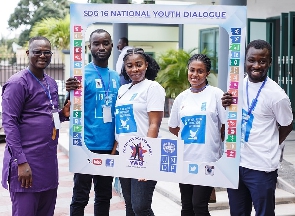As the world marks 75 years of UN Peacekeeping, this year’s International Day of
United Nations Peacekeepers resonates with the theme, ‘Peace Begins with Me’. In
a world too often plagued by conflict and discord, the pursuit of peace becomes an urgent and vital endeavour.
According to a Report of the UN Secretary-General on Promotion of durable peace and sustainable development in Africa, instability and conflict continue to generate and exacerbate poverty and institutional fragility, which in turn decrease the continent’s resilience and prospects for peace.
While global efforts to address conflicts on a larger scale are crucial, the true essence of sustainable peace lies in the collective actions and grassroots initiatives undertaken by individuals and communities. Durable peace begins from the ground up through local engagement, dialogue, and community-driven initiatives. By exploring strategies of prevention, early warning and protection, we can foster harmony, resilience, and lasting peace.
Building peace begins with prevention
To safeguard peace and security, African countries need to adopt appropriate
preventive strategies. Recent discussions at a UN Security Council meeting
highlighted the alarming rate at which terrorism and violent extremism are spreading in Africa. The persistent social, political, economic and cultural vulnerabilities across the continent make tackling extremism an even more complex challenge. Young people are at the heart of prevention as they are the main targets for radicalisation and violent extremism. It is essential to provide platforms and forums that encourage them to be active ambassadors of cohesion, peace and stability in their communities.
The UNDP and National Peace Council of Ghana e-Youth Impact
Series (YIS) serves as an exemplary forum for youth engagement. During one of the forums, participants emphasised the need for deliberate efforts to include youth in decision making processes and development initiatives. This is crucial to ensuring their active involvement in peace processes.
In this regard, inclusive dialogue and community participation have proven to be
powerful and effective tools for prevention. Recognising the threats and taking action to prevent radicalization towards violent extremism requires the collaboration and cooperation of all stakeholders at all levels. Addressing participants during a collaborative dialogue on preventing violent extremism, I emphasised the need for an enabling environment that fosters stronger collaboration between the state and the community to effectively prevent violent extremism.
Early warning is a catalyst for sustaining peace
To prevent disputes from escalating into large-scale conflicts, timely information about developing local crises is crucial for politicians, security agencies, and community leaders (Africa Renewal). In times of war, the focus often centres on resolving national political conflicts while communities grapple with their own disputes and tensions. Empowering diverse local peace actors to engage early and effectively can help prevent conflicts and promote peace among warring communities. This calls for deliberate efforts in empowering community members and building resilient peace defenders.
UNDP in Ghana is at the forefront of supporting Ghana’s peacebuilding efforts and capacity to prevent violent extremism by equipping women and youth with relevant skills. Through its Inclusive Integrated MSMEs Support Programme, participants are trained and tasked to become torchbearers for the campaign against violent extremism in their communities. Empowered with the ability to identify early warning signals and report them to security agencies, these individuals serve as ambassadors for PVE in their communities and groups.
Beneficiaries like Ayaabila Ramatu and Naba Amadu are already demonstrating the significant role community members can play in educating others and resolving conflicts, thus leading the way towards peaceful change.
Protecting peace is multidimensional
For countries emerging from wars and violence, protecting and sustaining peace
poses a daunting task. This is often because the underlying causes of the conflicts are not well understood or addressed, leaving room for potential instability.
Insecurity, inequality and exclusion are common drivers of conflict that must be dealt with conclusively to prevent recurrent conflicts and support the creation of productive livelihoods and resilient communities. By focusing on education, community engagement, and inclusive development, we can promote equal opportunities and build a peaceful future.
Conclusion
Conflict prevention, early warning systems, and protective measures are mutually
reinforcing strategies that contribute to ensuring the root causes of conflicts are addressed and conflicts prevented from recurring or occurring altogether. In the case of Africa, the continent’s young population necessitates tailored mechanisms to provide economic opportunities and prevent extremism. We must remember that investment in prevention is far more cost-effective than allocating resources to deal with the consequences of instability and violence through military interventions. As Kofi Annan reminded us “Cohesive and healthy societies rest on three pillars peace and security, development, the rule of law and respect for human rights.”
Regional News of Tuesday, 30 May 2023
Source: Praise Nutakor, Contributor













